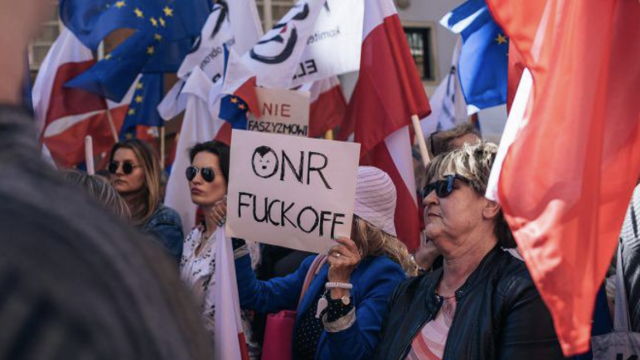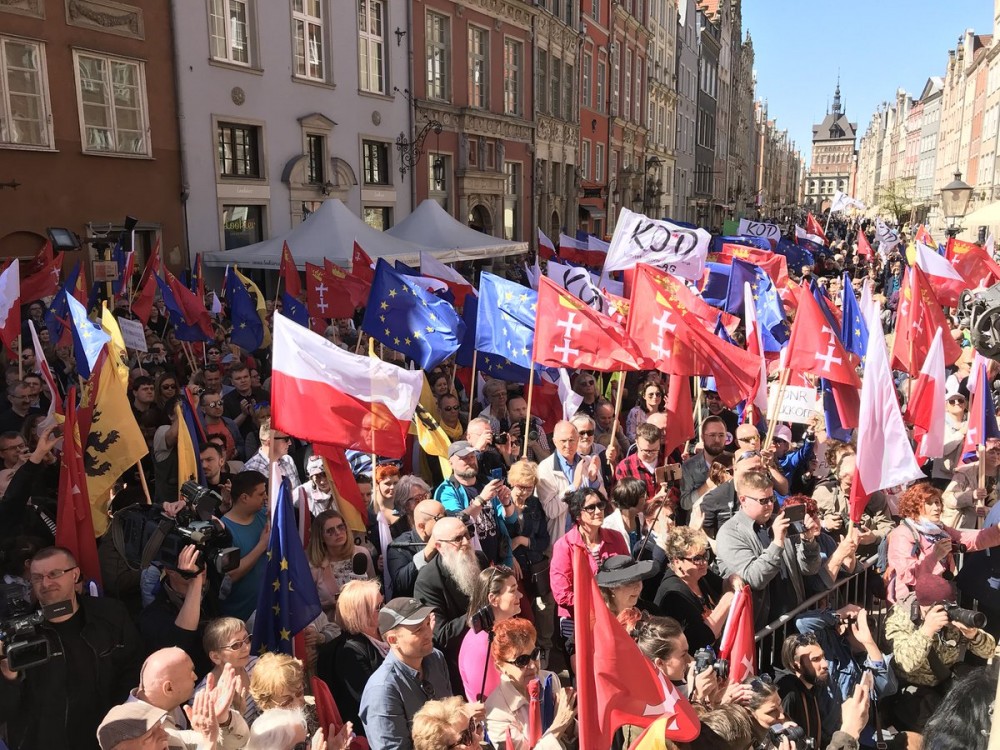
This is Part 17 in a series about Radical Municipalism looking at ways people worldwide are organizing in their cities to build power from the bottom up.
Read Part 1 (Brazil), Part 2 (Rojava), Part 3 (Chiapas), Part 4 (Warsaw), Part 5 (Bologna), Part 6 (Jackson, Miss.), Part 7(Athens), Part 8 (Warsaw & New York), Part 9 (Reykjavík), Part 10 (Rosario, Argentina), Part 11 (Newham, UK), Part 12 (Valparaiso, Chile), Part 13 (Porto Alegre, Brazil), Part 14 (Montevideo, Uruguay), Part 15 (Venezuela), Part 16 (Cape Town), Part 17 (Congo), and Part 18 (Jemna, Tunisia).
One of the world's leading municipalist innovators, Gdansk's Mayor Pawel Adamowicz, was murdered on Jan. 13 before a live television audience. In this article, Occupy.com pays tribute to Adamowicz by focusing on Gdansk's citizens' assemblies that he was instrumental in helping build, and which he saw as a democratic tool that could facilitate democracy in Poland and beyond.
Pawel Adamowicz (1965-2019)
Adamowicz's killing during a televised charity concert, where he was stabbed by a member of Poland's far-right, symbolized the ways that Poles are continuing to resist the country's lurch toward fascism.
The tragedy was similar to the murder of British MP Jo Cox, who was killed just before the 2016 Brexit referendum. Both politicians were assassinated by a violent individual, although the motive of Adamowicz's murderer is still not clear whereas Cox was killed by a far right terrorist.
What does seem clear is that Adamowicz would not have been killed were it not for the violent discourse that has been building across the country, increasingly normalizing violent acts and hateful rhetoric directed against marginalized groups and individuals.
In this case, Poland's state prosecutor decided that a far-right organization which had released mock death certificates of Adamowicz, and other human rights advocates, didn't warrant prosecution. How wrong that prosecutor was.
In death, Pawel Adamowicz deserves – and has received – global attention, somewhat the way that Marielle Franco was widely recognized after her tragic killing in Brazil. Both figures broke ground by standing up for marginalized groups through municipal politics. Through citizens' assemblies and other policies, Adamowicz resisted the far-right in Poland just as Marielle had resisted authoritarianism in Brazil.
Globally, the far-right is marching, making steady ground against the deepening crises of liberal democracy and capitalism. As this series has shown, municipalism offers a means to resist fascism through democratic alternatives. The citizens' assemblies of Gdansk, created during Adamowicz's tenure, are another key tool to create real democracy locally and globally.
Gdansk's citizens' assemblies are an antidote to encroaching fascism
Gdansk's democratic citizens' assemblies have occurred even as Poland has shifted notably to the right. The PiS nationalist government, since 2015, has drawn international condemnation for attacking the judiciary and women's and LGBT rights, as well as enabling – and in some cases leading – fascist demonstrations.
Three citizens' assemblies have moved Gdansk in the opposite direction. The last one strengthened civic participation, including bolstering rights for women, the LGBT community and migrants. Measures included promoting civic initiatives in municipal media, training teachers to counteract discrimination against marginalized and persecuted communities, and enabling school students to co-create their own curriculum.
“Another recommendation was tackling violence against women, including increasing funding to support services for survivors," the citizens' assemblies coordinator Marcin Gerwin explained. "The city will also examine how the men and women's sports are financed, and one example is that the women's rugby had worse access to the field, not to mention less money.”
Gdansk's other two citizen assemblies tackled smog pollution and the impact of climate change. Addressing severe smog in cities across Poland has become a key focus galvanizing municipalist actions, including in Warsaw. Through municipalist organizing, Gdansk is aggressively pushing against the nationalist government's climate denial.
How has Gdansk organized its citizens' assemblies?
After severe flooding caused by climate change, Gerwim proposed a citizens' assembly to Mayor Adamowicz. The mayor agreed, building on Gdansk's participatory budgeting process that has ongoing since 2013.
Citizens' assemblies in Gdansk were given the authority to make decisions, so long as 80 percent of the participants agreed (known as consensus-20). Firstly, using the electoral role, invitations are sent randomly to create a body of citizens that are representative of the city. Around 60 people attend, forming a city in miniature that is representative by age, gender, district and education level.
The group meets on a weekend and participants are given lunch with expenses paid. The group starts with a learning phase that is open to any stakeholders, for instance charities or businesses. The group looks at the problems they face and considers the possible solutions. When it came to dealing with climate-related floods, one solution was to keep a lake half full to absorb excess overflow.
The first meeting produces initial recommendations. The public can comment and provide input before the next meeting. Then the feedback is reviewed and the suggestions narrowed down. Trained facilitators enable the meetings, where people talk in groups of three or four. The facilitators use an algorithm that ensures as many people get to speak to one other before their ideas are brought back to the wider group. The meeting style is based on the 'World Cafe' method.
Gdansk's nearly half million citizens can also request that the mayor initiate a citizens' assembly with 1,000 signatures, or they can demand one with 5,000 signatures. Anyone interested in replicating a citizens' assembly can read this guide in English.
Thinking beyond the box
The citizens' assembly model provides a means to create demographic participation, which is particularly useful in cities or municipalities without a strong tradition of assemblies, for instance in places like Chiapas; Rojava, Syria, and Catalonia.
But even in places with a strong current of local assemblies, citizens' assemblies can help tackle big decisions. One theme that's evident after speaking to municipalists worldwide for this series is the fact that people can "take back the city" without taking control of civil servants. A common sentiment from radical municipalists is this: "We are transforming the city, but a big ship takes a long time to change course."
A positive aspect of citizens' assemblies, explained Gerwin, is that they're able to overcome the lack of civil servants with high quality and ambitious recommendations.
"For instance, the council before [the smog assembly] was removing 100 to 200 coal furnaces annually. Now the citizens say, we want all 10,000 coal furnaces removed within five years. The civil servants say 'But how?'”
Another recommendation to democratize schools has been similar. “This radical proposal gained over 80 percent support," he continued. "The civil servants again ask, 'How?' as they cannot implement what they don't understand, but it is evolving. The mayor is listening. You need an open mayor. In the short term it is hard for civil servants, but then citizens will appreciate the recommendations.”
Globally harnessing the wisdom of the crowd
Gdansk evolved its citizens' assemblies model from Australia, adding important aspects, not least that the mayor gave the assemblies the power to make decisions. There have also been citizens' assemblies in the Polish city of Lublin, with interest from other elected representatives across Poland.
Looking abroad, a citizens' assembly was used in the Irish referendum to end abortion. Now there is talk of using it to overcome the impasse over Britain's Brexit. Building on the experience of Gdansk and other successful citizens' assemblies, many feel the moment is ripe for Britain to evolve its democratic governance.
To borrow a phrase from Iceland – itself a laboratory for crowd-sourcing democracy – citizens' assemblies realize "the wisdom of the crowd". Among other legacies, Pawel Adamowicz deserves global acclaim for having the foresight and the trust to harness the wisdom of his municipality.
Read Part 1 (Brazil), Part 2 (Rojava), Part 3 (Chiapas), Part 4 (Warsaw), Part 5 (Bologna), Part 6 (Jackson, Miss.), Part 7(Athens), Part 8 (Warsaw & New York), Part 9 (Reykjavík), Part 10 (Rosario, Argentina), Part 11 (Newham, UK), Part 12 (Valparaiso, Chile), Part 13 (Porto Alegre, Brazil), Part 14 (Montevideo, Uruguay), Part 15 (Venezuela), Part 16 (Cape Town), Part 17 (Congo), and Part 18 (Jemna, Tunisia).












